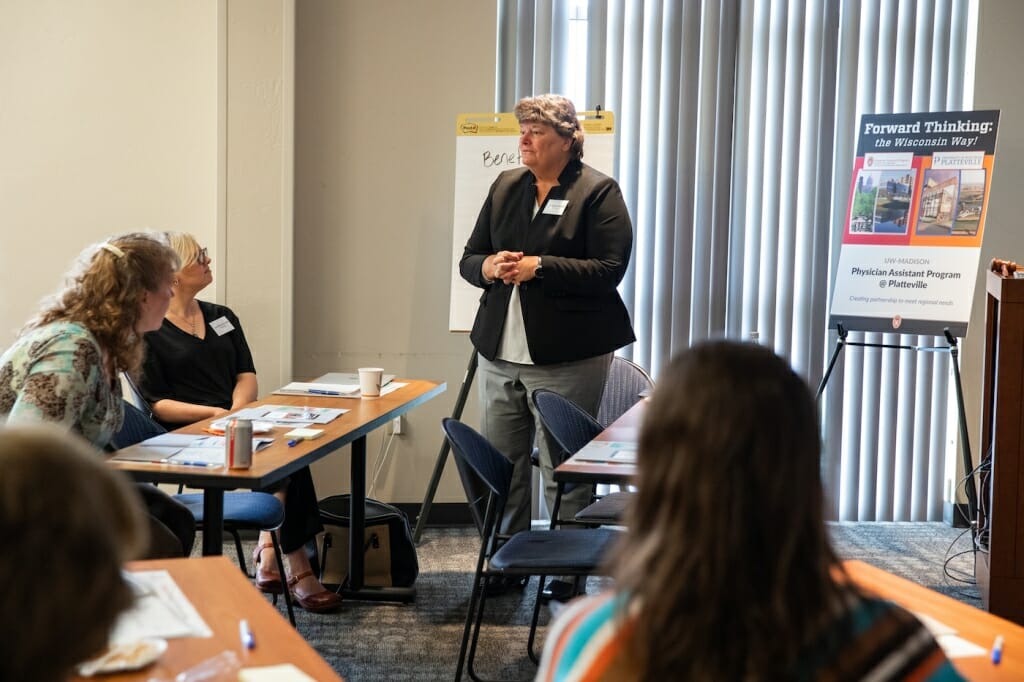UW-Platteville, UW-Madison explore PA partnership

Officials from UW–Madison and UW-Platteville have been working on a collaboration to train physician assistants for underserved areas. Left to right are Amanda Trewin, chair of biology at UW-Platteville; Erin Mccarthy Orth, student services program manager at the UW–Madison School of Medicine and Public Health; and Virginia Snyder, Physician Assistant Program Director at UW–Madison. UW-Platteville
The University of Wisconsin-Platteville and UW–Madison are exploring a new collaboration aimed at addressing a shortage of physician assistants in underserved rural areas.
Representatives from the Master of Physician Assistant Studies program at UW–Madison joined UW-Platteville representatives and area health care professionals to discuss expanding UW–Madison’s PA program to UW-Platteville.
Under the concept, students would earn a degree through UW–Madison’s nationally recognized program by attending classes at UW-Platteville. UW–Madison would provide administrative oversight. The UW–Madison program is part of the School of Medicine and Public Health.
Dr. Wayne Weber, the dean of UW-Platteville’s College of Business, Industry, Life Science and Agriculture, said the university’s Health Care Summit in 2017 showed one of the primary challenges identified in the area industry was the recruitment and retention of talent in rural areas. He noted U.S. Bureau of Labor statistics show the need for PAs is increasing by 37 percent nationwide, including 29 percent in Wisconsin.
The need in rural areas is even more acute, said Tara Streit, president of the Wisconsin Academy of Physician Assistants. She said one in every five PAs practicing in rural settings is approaching retirement age and noted that the burnout rate is high as PAs in rural areas see, on average, 13 more patients per week than their urban counterparts. The lack of PAs in underserved areas also has an impact on recruiting doctors, she added.
“If we are going to recruit physicians to these areas that need them, they are going to have to know that they will have partners who can help them,” she said.
Weber said these numbers show the tremendous opportunity for this proposed program to succeed.
“This is very much in high demand,” Weber said. “We’re strategically positioned for this. We’re in Southwest Wisconsin, which is rich in rural culture. We are also part of the tri-state region, which is a big advantage for us.”
He noted that UW-Platteville has approximately 300 biology majors, with more than half interested in health care and more than half hailing from rural communities. Most of the PAs practicing in the region have ties to UW-Platteville or are from the area.
Educating the students in close proximity to their communities is important, said Dr. Virginia Snyder, a certified physician assistant who directs UW–Madison’s PA program. “Keeping people close and connected to their roots and their home community will provide a really good opportunity to keep them there, to place them there in their communities,” she said.
Snyder noted that UW–Madison’s program is ranked in the top five percent of all programs nationally by U.S. News and World Report. The UW–Madison Physician Assistant Distance Education Program, an existing online three-year program, is ranked third nationally.
If approved, the UW–Madison PA Program at Platteville would involve two years of study.
Weber noted that with the soon-to-be-constructed Sesquicentennial Hall, UW-Platteville would be able to make possible health care renovations in Ottensman Hall, including a neurophysiology lab, exam room suite, dedicated distance lecture room and study areas. The timing is ideal, as the first cohort is projected to be on-campus by summer 2022, pending proposal development and the approval process.
“How we address these issues are step and step, and this discussion is the first step,” he said. “We will do it together.”
Dr. Joanne Wilson, UW-Platteville provost and vice chancellor for Academic Affairs, said, “This is really important to me. I was diagnosed with breast cancer three years ago, and I spent a lot of time in the car because we don’t have all the facilities here. We’re working very hard to make this happen. We’re committed to moving forward with this plan.”




